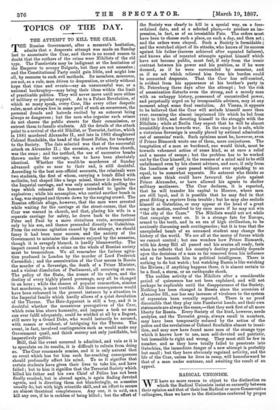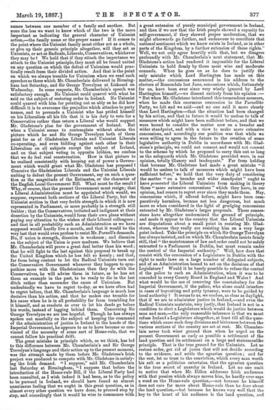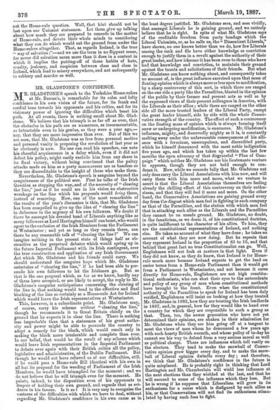RADICAL UNIONISM.
WE have no more reason to object to the distinction on which the Radical Unionists insist so earnestly between their opinion and that of their less Radical or more Conservative colleagues, than we have to the distinction conferred by proper names between one member of a family and another. But none the less we want to know which of the two is the more important as indicating the general character of Unionist action,—the family name or the proper name? If it comes to the point where the Unionist family must either act as a whole, or give up their generic principle altogether, will they act as Unionists, or act as Radicals, Liberals, Conservatives, whichever they may be ? We hold that if they attach the importance we attach to the Unionist principle, they must all be found united on any question on which the defeat of Unionism would prac- tically result from their divided action. And that is the point on which we always tremble for Unionism when we read such speeches as those which Mr. Chamberlain delivered in Birming- ham last Saturday, and Sir George Trevelyan at Liskeard on Wednesday. In some respects, Mr. Chamberlain's speech was satisfactory enough. No Unionist could quarrel with what he said on the subject of restoring order in Ireland. No Unionist could quarrel with him for pointing out so ably as he did how difficult it is to overcome the prejudice which attaches to party names, and to persuade a Unionist who has prided himself on his Liberalism all his life that it is his duty to vote for a Conservative rather than return a Liberal who would support Mr. Gladstone's plan for the government of Ireland. But when a Unionist seems to contemplate without alarm the picture which he and Sir George Trevelyan both of them paint for us of Gladatonian Liberals and Unionist Liberals co-operating, and even bidding against each other in their Liberalism on all subjects except the subject of Ireland, and on that subject voting in opposite lobbies, we confess that we do feel real consternation. How is that picture to be realised consistently with keeping out of power a Govern- ment which would grant what Mr. Gladstone has proposed Conceive the Gladstonian Liberals and the Unionist Liberals uniting to defeat the present Government, say on such a ques- tion as the magnitude of the Estimates, or the character of the English Local Government Bill. What must be the result? Why, of course, that the present Government must resign; that a Liberal Administration must be appointed which would, we suppose, represent both sections of the Liberal Party, but the Unionist section in that very feeble strength in which it is now represented in Parliament, or more probably in a strength still feebler ; that the Conservatives, irritated and indignant at their desertion by the Unionists, would form their own plans without paying any attention to the wishes of their Liberal colleagues ; and that in all probability such an Administration as we have supposed would hardly live a month, and that it would be the very last that would even profess to resist Mr. Parnell's demands. No, if union is strength, disunion is weakness ; and disunion on the subject of the Union is pure madness. We believe that Mr. Chamberlain will prove a great deal better than his word ; that he will fight to the last against this proposal to break up the United Kingdom which he has felt so keenly ; and that, far from being content to let the Radical Unionists turn out the Conservative Government whenever they happen to sym- pathise more with the Gladstonians than they do with the Conservatives, he will advise them in future, as he has set them an example in the past, to be ready to die in the last ditch rather than surrender the cause of Unionism. But undoubtedly we have to regret to-day, as we have often had to regret before, that Mr. Chamberlain's language is much less decisive than his action' and that he makes one tremble for his cause when he is in all probability far from trembling for it himself, and as resolute as ever to let his deeds go before his words, instead of lagging behind them. Concerning Sir George Trevelyan we are less hopeful. Though he has always spoken out manfully on the subject of keeping the command of the administration of justice in Ireland in the hands of the Imperial Government, he appears to us to have become so con- vinced of the necessity of some sort of Home-rule, that we cannot follow his practical drift.
The great mistake in principle which, as we think, has led to this difference between Mr. Chamberlain's and Sir George Trevelyan's language and their action up to the present moment, was the attempt made by them before Mr. Gladstone's Irish project was produced to compete with Mr. Gladstone in satisfy- ing the Irish demand. "I suppose," said Mr. Chamberlain last Saturday at Birmingham, "I suppose that before the introduction of the Home-rule Bill, if the Liberal Party had been consulted, as I wish indeed it had been, as to the policy to be pursued in Ireland, we should have found an almost unanimous feeling that we ought in this great question, as in almost every other question we have done, to proceed step by step, and accordingly that it would be wise to commence with a great extension of purely municipal government in Ireland, and then if we saw that the Irish people showed a capacity for self-government, if they showed proper moderation, that we might afterwards go further, and endeavour to conciliate that national sentiment which we know exists in Ireland, as in other parts of the Kingdom, by a further extension of those rights." Well, we not only agree heartily with that, but we disagree profoundly with Mr. Chamberlain's next statement, that Mr. Gladstone's action had rendered it impossible for the Liberal Unionists to hold firmly by those most wise and moderate counsels. When he goes on as he does to justify the only mistake which Lord Harlington has made on this matter,—the concessions announced in his address to the electors of Rossendale last June, concessions which, fortunately for us, have been ever since very wisely ignored by Lord Harlington himself,—we dissent entirely from his opinion :— "But when Mr. Gladstone introduced this tremendous measure, when he made this enormous concession to the Parnellite Party, we felt and we said—and no one said it more clearly than Lord Hartington—that the situation had been changed by his action, and that in future it would be useless to talk of measures which might have been sufficient before, and that we were bound to consider the matter now on a broader and wider standpoint, and with a view to make more extensive concessions, and accordingly our position was that while we were willing to agree in the future to the creation of some legislative authority in Dublin in accordance with Mr. Glad- stone's principle, we could not consent and would not consent to the scheme by which he proposed to carry this out so long as the safeguards which Mr. Gladstone provided were, in our opinion, totally illusory and inadequate." Far from holding that because Mr. Gladstone had made a great mistake it would be useless to talk of measures which might have been sufficient before," we hold that the very duty of considering the matter "on a broader and wider standpoint" ought to have prevented the Liberal Unionists from making in theory those "more extensive concessions" which they have, in our opinion, had reason to regret ever since they made them. Nay, concessions which, if offered before, might have been com- paratively harmless, became not less dangerous, but much more so when considered in the light of grudging concessions extracted by Mr. Gladstone's larger proposals. These conces- sions have altogether undermined the ground of principle, and made it appear to the country that the Liberal Unionists are disputatious about a small point in resisting Mr. Glad- stone, whereas they really are resisting him on a very large point indeed. Take the principle on which Sir George Trevelyan has always insisted, and on which Mr. Chamberlain insists firmly still, that" the maintenance of law and order could not be safely entrusted to a Parliament in Dublin, but must remain under the control of the Imperial authority." Well, how does that consist with the concession of a Legislature in Dublin with the right to make laws on a large number of delegated subjects, and of an Administration bound to act on the decisions of that Legislature ? Would it be barely possible to refuse the control of the police to such an Administration, when it was to be conceded to every County Board in England and Wales? And what would be the use of reserving the constabulary for the Imperial Government, if the police, who alone could interfere in cases of boycotting and petty tyranny, were to be guided by local authority It seems to us, we confess, as clear as daylight, that if we are to administer justice in Ireland,—and even the Radical Unionists maintain, very justly, that Ireland is not in a condition to elect a Legislature which would do justice between man and man,—the only reasonable inference is that we mast refuse Ireland a Legislature altogether, at least till all the ques- tions which cause such deep divisions and bitterness between the various sections of the country are set at rest, Mr. Chamber- lain never took wiser ground than when he urged on the present Government as early as possible a settlement of the land question and its settlement on a large and statesmanlike principle. That is the true ground for the Unionists. Let us restore order, get rid of juries that will not decide according to the evidence, and settle the agrarian question ; and for the rest, let us trust to the conviction, which every man worth his salt as a politician entertains, that the agrarian question is the true secret of anarchy in Ireland. Let no one omit to notice that when Mr. Dillon addresses Irish audiences with that passion which always moves him, he hardly ever says a word on the Home-rule question,—not because he himself does not care far more about Home-rule than he does about the land question,—but because he knows very well that the key to the heart of his audience is the land question, and not the Home-rule question. Well, that hint should not be lost upon our Unionist statesmen. Let them give up talking about how much they are prepared to concede in the matter of Home-rule, and devote their whole minds to considering what they can do which would cut the ground from under the Home-rulers altogether. That, as regards Ireland, is the true "way of salvation ;"—and we use the term in no flippant sense, for never did salvation mean more than it does in a context in which it implies the putting-off of those habits of hate, cruelty, jealousy, and suspicion between class and class in Ireland, which lead to misery everywhere, and not unfrequently to robbery and murder as well.




































 Previous page
Previous page